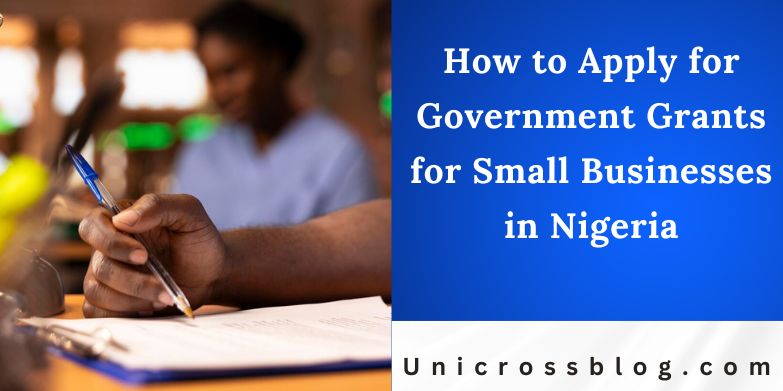In Nigeria’s dynamic economy, small businesses are the lifeblood of innovation, job creation, and community development. They contribute over 50% of the nation’s employment and a significant share of GDP, yet many struggle with limited access to capital. Government grants offer a vital lifeline—non-repayable funds designed to fuel growth without the burden of loans or interest. These initiatives, spearheaded by agencies like the Small and Medium Enterprises Development Agency of Nigeria (SMEDAN), the Bank of Industry (BOI), and the Federal Ministry of Industry, Trade and Investment, target sectors such as agriculture, technology, manufacturing, and fashion to promote sustainable entrepreneurship.
As of 2025, with economic recovery efforts intensifying post-global challenges, the government has expanded programs like the Presidential Conditional Grant Scheme (PCGS) and SMEDAN’s Conditional Grant Scheme (CGS), disbursing billions of naira annually. These grants empower nano, micro, and small enterprises, particularly those led by youth, women, and rural entrepreneurs. Applying for these opportunities requires preparation, but the rewards—up to N500,000 or more per beneficiary—can transform a modest venture into a thriving operation. This guide demystifies the process, equipping you with actionable steps to secure funding and scale your business effectively.

Step-by-Step Guide to Applying for Government Grants
Securing a government grant in Nigeria involves research, documentation, and persistence. The process typically takes 4-12 weeks, depending on the program, and emphasizes transparency to ensure funds reach viable, impactful businesses. Follow these steps to maximize your chances.
1. Research and Identify Suitable Programs
Start by pinpointing grants aligned with your business. Government programs prioritize innovation, job creation, and sector-specific needs. Key options include:
- Presidential Conditional Grant Scheme (PCGS): Targets nano-businesses (under 4 employees, turnover below N1 million) with N50,000 grants, conditional on hiring one additional worker. Ideal for petty traders, artisans, and service providers.
- SMEDAN Conditional Grant Scheme (CGS): Offers N50,000 to micro-enterprises for equipment and workforce support, focusing on local government areas (LGAs) to boost nano-businesses.
- Youth Entrepreneurship Support (YES) Programme by BOI: Provides grants alongside low-interest loans for youth aged 18-35 in tech, agriculture, and manufacturing. Grants reward innovative projects with up to N5 million.
- MSME Survival Fund: A post-pandemic initiative offering payroll support and artisan grants up to N200,000 for affected businesses in trading, ICT, and creatives.
- FGN Alat Skillnovation Grants: Up to N500,000 for tech-enabled startups in agriculture, clean energy, and logistics, emphasizing scalability and ethical operations. Explore these via official government portals or agency offices. Prioritize programs matching your business stage—seed for startups, growth for established ones.
2. Check Eligibility Criteria
Most grants have strict, merit-based requirements to ensure equitable distribution. Common criteria include:
- Business Registration: Must be registered with the Corporate Affairs Commission (CAC) as a sole proprietorship, partnership, or limited liability company. Unregistered businesses often qualify for nano-grants like PCGS if they provide proof of operation (e.g., tax receipts).
- Age and Demographics: Many favor youth (18-35), women, or persons with disabilities. For instance, YES requires Nigerian citizenship and a viable business plan.
- Business Size and Viability: Nano/micro-enterprises (assets under N1 million, fewer than 10 employees) are preferred. Submit evidence of ongoing operations, like bank statements or sales records.
- Sector Focus: Alignment with national priorities—agriculture (e.g., ACGSF for farming SMEs), tech, or sustainable practices.
- Location: Nationwide, but some (e.g., SMEDAN CGS) emphasize rural or LGA-based businesses.
- No Defaults: Clean credit history; no prior grant misuse. Review program-specific rules—e.g., PCGS excludes those with assets over N1 million—to avoid disqualification.
3. Prepare Required Documents
A strong application hinges on complete, accurate paperwork. Assemble these essentials:
- Business Plan: A 10-20 page document outlining your idea, market analysis, financial projections (3-5 years), and impact (e.g., jobs created). Use simple templates from SMEDAN.
- Proof of Identity: National ID, voter’s card, or passport for the owner.
- Registration Documents: CAC certificate, Tax Identification Number (TIN), and memorandum of association.
- Financial Records: Last 6-12 months’ bank statements, profit/loss statements, and asset valuation.
- Project Proposal: For grants like CGS, detail how funds will be used (e.g., equipment purchase) and repayment-free impact.
- References: Letters from community leaders or prior clients attesting to your reliability. Digitize everything for online submissions. Tailor documents to highlight innovation and social value—e.g., how your agribusiness reduces food imports.
4. Submit Your Application
- Applications are mostly online via dedicated portals, reducing bureaucracy.
- Register on the program’s platform (e.g., SMEDAN’s site for CGS or BOI’s MSME portal).
- Fill out forms accurately, uploading documents in PDF/JPEG format (under 5MB each).
- For PCGS, apply during open windows (often quarterly) through local government collaborations.
- Pay any nominal fees if required (rare for grants). Submit early—deadlines are firm, like March 1 for some BOI cycles. Track status via email confirmations.
5. Undergo Review and Follow Up
- Expect a multi-stage evaluation: initial screening (1-2 weeks), expert panel review (business viability, impact), and possible interviews or site visits. Scoring weighs innovation (30%), feasibility (25%), and inclusivity (20%). If shortlisted, prepare for virtual or in-person pitches. Respond promptly to queries. Successful applicants receive disbursements within 4-6 weeks via bank transfer. Unsuccessful? Request feedback and reapply—many improve with each cycle.
6. Utilize the Grant and Report Back
Funds come with conditions, like quarterly progress reports for PCGS. Use them as specified (e.g., no personal withdrawals) to build credibility for future funding. Track metrics like revenue growth or hires to demonstrate ROI.
By methodically following these steps, entrepreneurs like Aisha, a Lagos-based fashion designer, have turned N50,000 CGS grants into expanded workshops employing five locals. Persistence pays—over 1 million SMEs benefited in 2024 alone.
READ ALSO: Social Media Marketing for Entrepreneurs: A Complete Guide
FAQs
Are government grants truly free, or do they require repayment?
Yes, they are non-repayable, unlike loans. However, conditional grants like PCGS mandate actions such as hiring staff, with clawbacks for non-compliance.
How competitive are these grants, and what are my odds?
Highly competitive—e.g., PCGS receives millions of applications for 500,000 slots annually. Strong business plans boost chances to 10-20% for qualified applicants.
Can unregistered businesses apply?
Limited options exist for nano-businesses via PCGS or SMEDAN, using operational proofs. Registering with CAC unlocks more opportunities and builds credibility.
What if my business is in a rural area?
Many programs, like CGS, prioritize rural/LGA enterprises. Location can be an advantage, especially for agriculture-focused grants.
How long does the entire process take?
From application to disbursement: 1-3 months. Factor in preparation time (2-4 weeks) for a polished submission.
Are there grants specifically for women or youth?
Absolutely—YES and MTN Yellopreneur target youth/women, offering tailored training alongside funds up to N5 million.
What happens if my application is rejected?
Use feedback to refine and reapply. Explore alternatives like BOI loans or private grants from Tony Elumelu Foundation.
Do I need a guarantor or collateral?
No, grants don’t require these. Focus on documentation proving viability instead.







